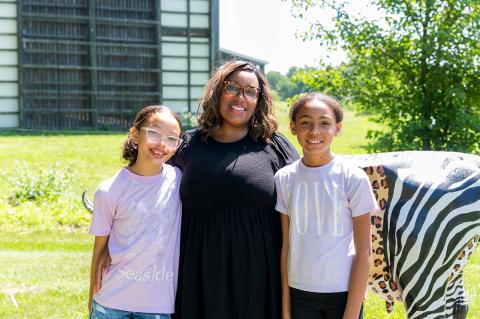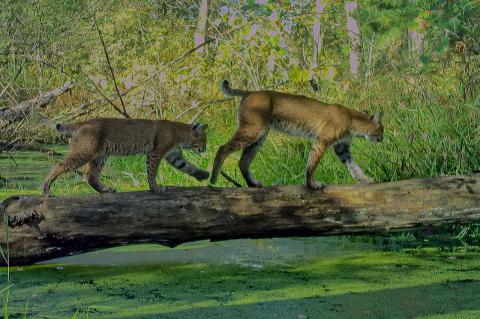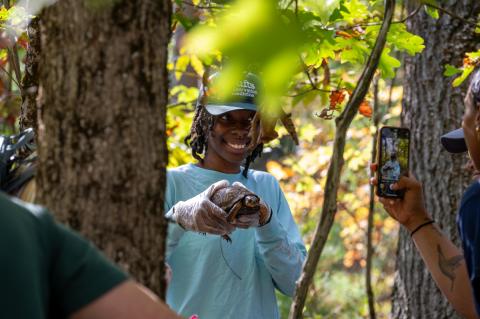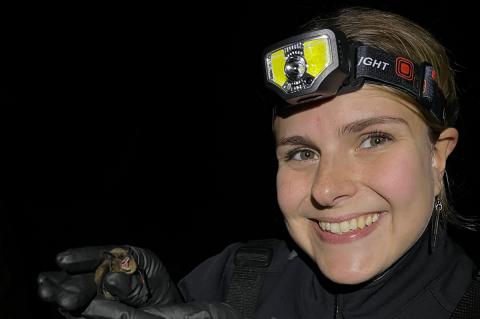Curriculum
The interdisciplinary, team-taught courses are designed to provide graduates with foundational knowledge in the various contributing fields of conservation medicine.
For more information visit the Graduate Admissions page.
Support wildlife and environmental education and appreciation with a collectible featuring wildlife from Cummings School's Grafton campus, fantastic creatures & beautiful settings! Your $25 goes to support MCM Student Externship Scholarships!
Order by Venmo @MCMProgram. For more information, email mcm@tufts.edu.

The M.S. in Conservation Medicine (MCM) uses a One Health approach to address urgent issues facing our planet, including emerging and resurging diseases, habitat use conflicts, environmental contamination, ecosystem and climate change, biodiversity loss, and ecosystem function degradation.
MCM students are passionate problems solvers, by nature. They are action-oriented individuals trained to investigate problems beyond STEM disciplines integrating political, social, cultural, economic and other factors to help solve global health issues.
Students enter the MCM program with unique experiences, passions, and perspectives. They network amongst each other, faculty and guest lecturers to motivate each other, learn from one another other, share thoughts and viewpoints, and tackle problems.
Through small group learning, individual mentoring, capstone project work and hands-on externship experiences, MCM students gain practical knowledge to address complex issues affecting our world today.
In the M.S. in Conservation Medicine program, students will:
Funding for the initiation of MCM program was provided by leadership grants from The Regina Bauer Frankenberg Foundation for Animal Welfare, and H. Jay Sarles and Marilyn Sarles, MD. In addition, funding from the V. Kann Rasmussen Foundation has supported Tufts Center for Conservation Medicine at Cummings School since its inception, laying the groundwork to make this degree program possible.
The interdisciplinary, team-taught courses are designed to provide graduates with foundational knowledge in the various contributing fields of conservation medicine.
Externships provide students with insight into how conservation medicine issues are addressed and how interdisciplinary approaches can be applied in a real-world setting.
Students undertake an intensive, year-long case study project to comprehensively analyze a challenging conservation medicine problem.
MCM graduates are a well-trained cohort of transdisciplinary, passionate individuals committed to working together to identify, improve and solve issues negatively impacting today's complex world.
More information about conservation medicine can be found at Tufts Center for Conservation Medicine.
Graduates of the Master of Science in Conservation Medicine (MCM) are uniquely prepared to become leaders in many critical areas of conservation medicine.
The M.S. in Conservation Medicine is an interdisciplinary program designed to provide the training, foundational knowledge, and skills necessary for real world conservation efforts. Graduates of this program are uniquely prepared to enter a wide variety of health, conservation, and policy careers armed with the broad perspective and interdisciplinary skills this program provides.
Applicants must have completed the equivalent of a bachelor's degree at an accredited college or university. An advanced degree is not required to apply. Since many disciplines are involved in conservation medicine, the program seeks a diversity of backgrounds for each entering class, including veterinarians, natural and social scientists, engineers, public health and medical professionals, lawyers, policy and wildlife professionals, and others interested in applying their expertise to conservation medicine issues.
Applicants should have a good understanding of conservation medicine's aims and appreciate the value of a One Health approach to human, animal, or environmental health issues. Students should have attained a broad-based education and range of experience, ideally including international or cross cultural exposure and the ability to work collaboratively. Good communication skills, foreign language skills, and writing skills exemplified in a publication record are highly desirable.
Applicants must meet all application requirements and submit an online application by one of the rolling deadlines to be considered for admission to the program. Approximately fifteen students are admitted to the MCM Program each year.
Embracing a truly interdisciplinary approach, the Master of Science in Conservation Medicine features a team of impressive faculty and experts to facilitate coursework and research. By the end of this 12-month program, students have learned from, collaborated with, and proven themselves to dozens of leaders and top experts in conservation medicine and related fields. This multi-disciplinary team is a great benefit to both our students’ education during the MCM program and their career opportunities afterward.
The program collaborates across disciplines within the veterinary school, across the university, and with colleagues around the world, in research as well as in teaching. Our diverse faculty—which includes wildlife and other veterinarians, epidemiologists, ecologists, policy experts, environmental engineers, and others—have pursued research at home and around the world in wildlife conservation, infectious diseases, environmental toxicants, humane animal population control, and environmental monitoring.
Interdisciplinary faculty and resources are drawn broadly from all schools at Tufts University including Cummings School of Veterinary Medicine, Graduate School of Arts and Sciences, School of Engineering, Fletcher School, School of Medicine, and the Friedman School of Nutrition Science and Policy, as well as from the Consortium for Conservation Medicine.






Program Faculty and Staff
Dr. Chris Whittier
Program Director
chris.whittier@tufts.edu
Dr. Alison Robbins
Assistant Director
alison.robbins@tufts.edu
Tracey Glover
Program Coordinator
Phone: 508- 887-4812
tracey.glover@tufts.edu
Office of Admissions
Cummings School of Veterinary Medicine at Tufts University
200 Westboro Road
North Grafton, MA 01536
Phone: 508 839-7920
Fax: 508 887-4820
vetadmissions@tufts.edu